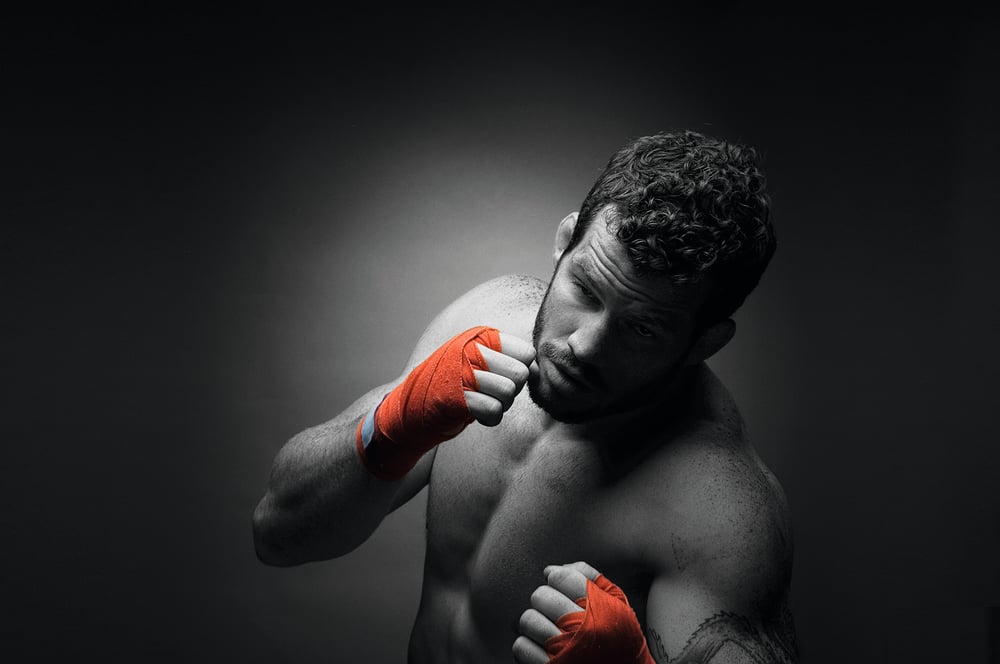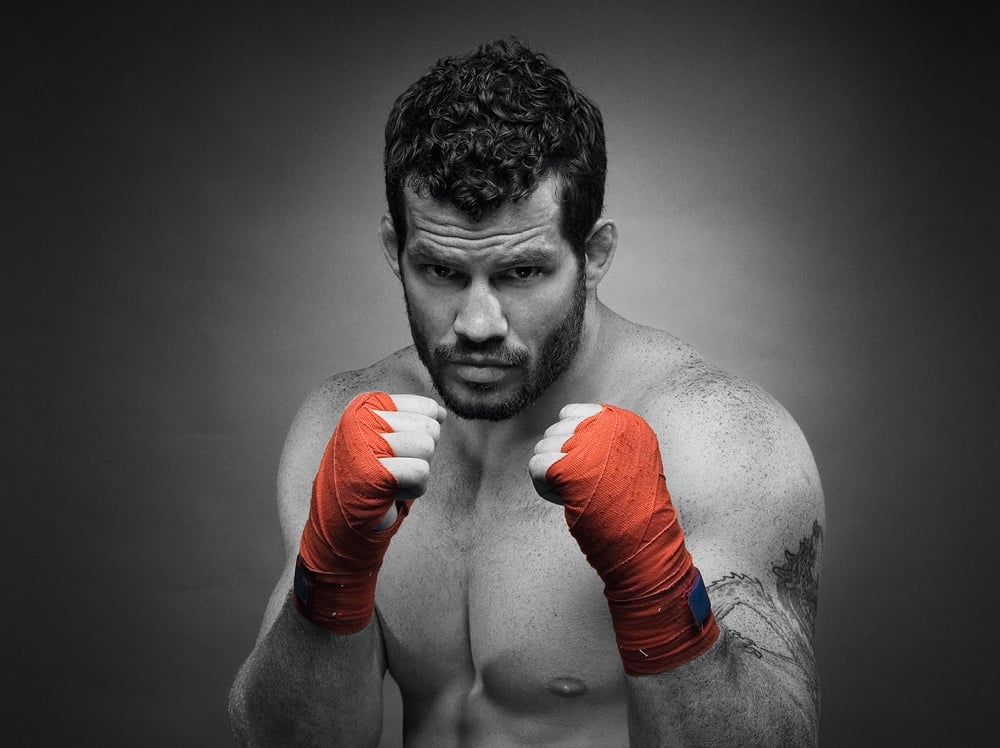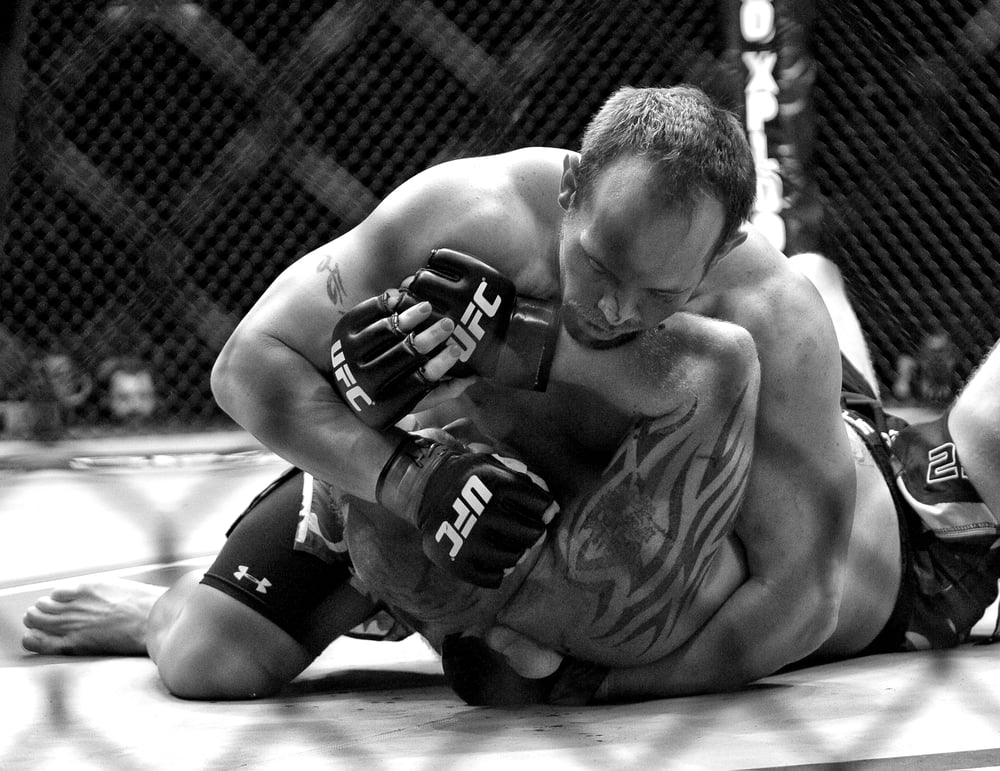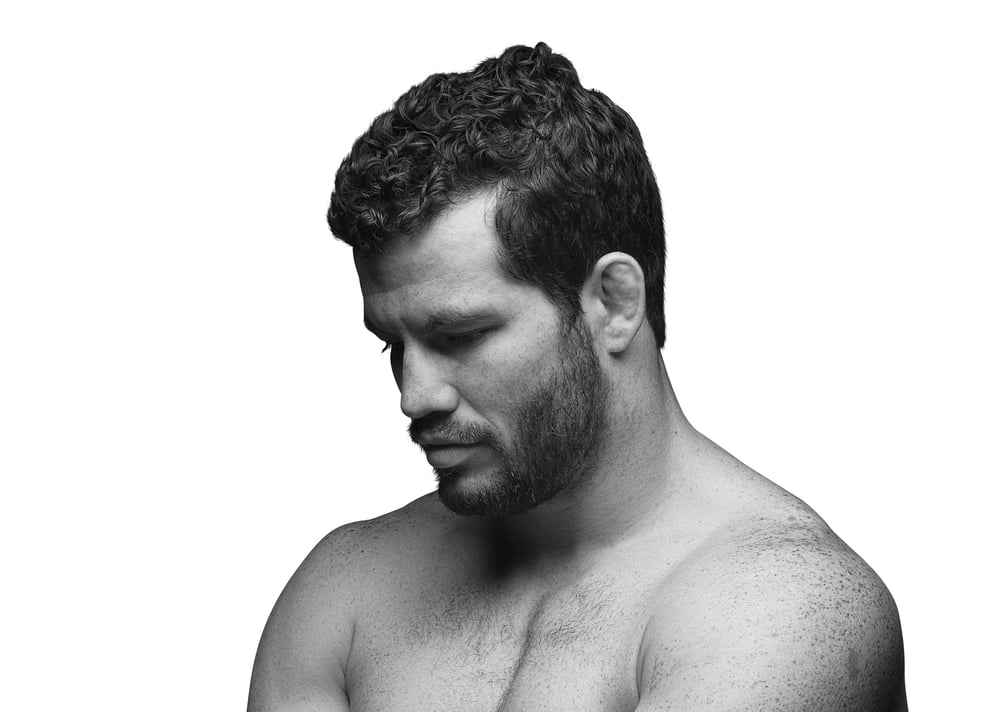
Issue 059
February 2010
Nate ‘the Great’ Marquardt has been terrorizing the UFC middleweight division since his signing with the promotion in 2006. He went from an unknown to title challenger in under a year and is fighting with one goal: to get a rematch with Anderson Silva.
Marquardt is preparing for his next challenge in the mile-high martial arts retreat of High Altitude MMA in Aurora, Colorado, the academy he owns and manages. There’s not a lot of flash to Nate Marquardt – he’s not one to give a good soundbyte or to trash-talk an opponent; he’d much rather get in there and fight.
A record-breaking seven-time King of Pancrase, Marquardt is a strong and stylish competitor, a keen and insightful student of the game with a massive skill set and the ability to finish a fight in any range. He is one of the few fighters to have that rare combination of serious knockout power and the ability to take a shot.
If you’re looking for examples of Marquardt’s versatility and ability to do it all, then consider this: He laid out jiu-jitsu ace Demian Maia with one punch, stopped the tough Brazilian Wilson Gouveia with an unanswered ten-hit combination like something out of a video game, was only the sixth fighter to submit the talented Jeremy Horn and sent Martin Kampmann down to welterweight with a brutal kick to the head. He’s what Joe Rogan has called “a very thick, strong guy and a slick striker.”
Kampmann, Gouveia and Maia were all in the way of another shot at the middleweight champion Anderson ‘The Spider’ Silva, and the 30-year-old Colorado native took them all out inside the distance (only Gouveia made it past the first round). Maia was his latest victim; the world-class grappler ran into a buzz saw right hand before a bead of sweat could form on Marquardt’s brow. The crushing shot left the Brazilian in a heap on the mat only 21 seconds into the fight. “I watched tape on him and saw how he telegraphed the left high kick because he’s a southpaw,” Marquardt says of the grappler. “I just stepped in and threw the overhand right.”
There was noticeably no follow-up, although Marquardt’s right hand was cocked and ready. In stark contrast to Dan Henderson’s brutal shot to an unconscious Michael Bisping at UFC 100, Marquardt’s actions stand out. “I saw his eyes and he was completely out. I didn’t want to hurt him any worse,” he says of holding back. “I knew he was out of that fight and I didn‘t want to cause any further damage, and also I didn‘t want to have him wake up and grab a hold of me and start to recover.”
Marquardt had his shot against Anderson Silva in 2007. It was Silva’s first defense of the middleweight title (the Brazilian’s fight with Travis Lutter was his first as a champion, but the belt was not on the line due to Lutter missing weight). Marquardt ‘choked’ – he froze on the big stage and succumbed to Silva in the first round. He’s not the first fighter to have done so – Forrest Griffin, James Irvin… Silva can make even great fighters look ordinary.
Everything about Marquardt since then has been about getting that second shot at Silva, but to understand the modest and quiet contender, you must look back to his time before the UFC

Marquardt’s martial arts career began when he was 15 years old. He trained in kickboxing, wing chun, kenpo and BJJ under Alistair McNiven. What got him interested in the hurt business was the same thing that inspired many other fighters to start MMA. “When I was a kid I watched the UFC on TV and I remember Royce Gracie and how very small he was and how he was beating bigger guys. I was really small in high school so I really liked it. Initially Royce Gracie was my favorite fighter and then I liked Bas Rutten, Frank Shamrock and Sakuraba. When the opportunity was there I went to Pancrase and those guys definitely influenced me.”
A veteran of almost 40 fights, Marquardt started fighting in 1999 and six fights (and six submission wins) into his career was invited to fight in Japan in Pancrase. His first fight was against the then-unknown Genki Sudo (Marquardt was a lot skinnier back then and fought under 170lb). The 20-year-old Marquardt lost by armbar, but impressed enough to be invited back in 2000. He fought almost exclusively for them for the next five years and went on to become the first middleweight ‘King of Pancrase’, defeating Daiju Takase, Kiuma Kunioku and Shonie Carter to claim the crown. He held the title, which is highly esteemed on the Japanese MMA circuit, a record seven times, vacating it when he left to join the UFC in 2006.
Had history played out differently, Marquardt may never have fought for Pancrase. Though he won the Bas Rutten Invitational 4 tournament in 1999 (which promised a contract in the UFC to the overall winner) his transition to the American organization never happened. “At that point the winners were getting contracts with the UFC. But the tournament that I fought on the guy [from the UFC] just happened to not show up.”
His pairing with the ‘mad scientist’ of MMA, Greg Jackson, also had its roots in Japan. Marquardt met Jackson over there when he fought on the same bill as Keith Jardine. “[Keith] had a fight against Keiichiro Yamamiya, and so Keith and Greg were over there. We had to cut weight – we actually had to weigh in on the same day. They switched it up on us and both of us were pretty overweight. He had 17lb to cut and I had about 14lb to cut – we basically had to cut it the day of the fight. Neither one of us made the weight on the first attempt, but we both made it the second time. We were both pretty worn out. I gave Keith an extra Pedialyte that I had and he just thought I was awesome since then. He invited me to come train with him and Greg. I took him up on the offer a year later – the training is just really good down there in Albuquerque.”

For a young American the experience of living and fighting in Japan was a total culture shock, as Marquardt explains: “It was completely different. I told my friends there it’s kind of like being in another world; everything is different, the culture is different. Not knowing the language and stuff like that made it tough, but it was a really cool experience and I wouldn’t change it.” Japanese fans are famous for the silence during MMA bouts, a far cry from the screaming fanatics you see in the crowd at an average UFC event, and though Marquardt doesn’t think they will ever be too alike he does see a change taking place. “I think the American fans are different now than say ten years ago. The American fans are starting to be educated. The Japanese fans have always had martial arts in their culture. They teach judo in their schools and their colleges and stuff. They already understand it and they can appreciate it as a sport, and not as a spectacle. When they’re watching the fights you can see it’s completely different there. It’s very quiet. I do get recognized more in the street in Japan though. I learned a lot over there with Pancrase. It was a great experience. Their philosophies are different in the way they train. I was able to pick the stuff I liked out of their culture and use it over here and vice versa. It’s been very beneficial to my career to have fought over there for that long and to have trained over there.
“Pancrase was a great breeding ground because they are a really smart organization. They picked fighters that they saw potential in and the fighters they picked turned out to be really great fighters. One time when I fought a Japanese fighter over there, Bas Rutten was in the audience and I could hear his voice. I couldn’t even hear my own corner men, but I could hear him, so it was kind of cool. We got to talk before and after, so that was a really cool experience. My first fights out there were 15-minute fights, no rounds, just one 15-minute fight. One of the title fights was a 20-minute fight just straight through. After that though, they switched to where it was just the three five-minute rounds. I think you have to be fitter for the five-minute rounds because you fight at a higher pace. When you fight at a twenty-minute pace you fight a lot slower and you pace yourself more. I think you have to be more of an athlete to do the five-minute rounds.”
Marquardt’s last fight for Pancrase took place in 2005, and the Colorado native has been signed to the UFC ever since his return to the USA. Easily coping with the transition from Pancrase to the UFC, Marquardt has carved himself a reputation as one of the top middleweights in the UFC (and the world). Aside from the various challengers and contenders kicking around at 185lb, there is one other person all fighters must deal with, namely Dana White. Marquardt has faced off with some of the sport’s best fighters, but what is it like to meet White? “He’s the boss. I don’t really talk to him too much – I fight when they tell me to fight and that’s about it,” he says.

As Dana White and co push the brand forward more than ever, Marquardt notices more and more signs of entry into the mainstream. “I was just on the UFC site today and I saw that Burger King was one of the main sponsors on there. I just think that it is going to continue to grow and get more popular all around the world. It’s going to take time for MMA fighters to make the kind of money that top-level boxers make. The more leverage the fighters have, the more they can get paid – and right now they are gaining in leverage and the top guys are getting paid pretty well. The UFC is definitely the best organization to take us forward. There is no doubt about that.”
Does he see room for improvement in MMA? “Yes, absolutely. If they could provide health insurance,” he laughs. “That would be a nice thing and would help the sport become more mainstream as well. It’s tough when you don’t have health insurance. The referees and the rules could also be improved, but it will take some time. You know, some of the refs and the athletic commissions don’t know the rules 100%. I think that over time though, everyone will learn the rules and that will make things better for everyone.”
The 6’1” 185lber has got some interesting thoughts on the division he calls home. “I don’t feel that the UFC middleweight division is the most stacked in the organization,” he says. “There are tough guys across the board in all the divisions. For a while, the heavyweight division was a little too thin but in the last year or two it’s gotten a lot better.” Marquardt is in a perfect position to comment on this, as he is a training partner of heavyweight title hopeful Shane Carwin [see sidebar ‘Weighing In on The Heavyweights’].

With three back-to-back dominating and decisive victories in the last 18 months, one would assume that Marquardt’s head would be expanding at a rapid rate, but the Denver native learned more than how to fight in Japan. He seems to have picked up the stoic Zen-like freedom from the ego so rampant in the West. Marquardt is a very unassuming and soft-spoken 30-year-old and is as cool as the other side of the pillow – except when you bring up Anderson Silva.
The Brazilian arachnid straddles the middleweight division like a colossus, and Marquardt gets stirred up whenever he comes up in conversation. Their first meeting ended badly – Marquardt hit the deck and was mauled by a series of punches that prompted a swift stoppage. He had seen the peak and could almost taste it, only to stumble before the summit was conquered. You can tell that it eats at the hungry fighter. He yearns for redemption. What would he do differently if he gets that redeeming opportunity? “I’d beat him up” he says, laughing. “I have things strategically that I would change. The main difference would be that I didn’t do my best in that fight, and mentally, I just was not in the right place.
“If I can change both those elements it will be a completely different fight.” He added, “If you want to see someone get in the ring with Anderson – with the abilities – then that’s me. If you want to see someone with the ability to kick Anderson’s butt, then I’m your guy. I know I can hang with him on the feet. I have world-class striking training partners, guys from K-1, professional boxers. I know what to expect from that level fighter. In UFC 73 the biggest thing was the lack of killer instinct and confidence. I’m a lot better technically, I’m better on my feet and my wrestling has improved. I’m way quicker, and I have a world-class strength coach too. I‘m just a completely different fighter.”
It’s a fight that the fans would love to see and it may happen soon if Silva stays in the division. The 185lb champ seems to be flirting with a move up in weight though, and Marquardt isn’t pleased about the prospect. “I think it’s a little disrespectful of Silva to say that there is no-one for him to fight.” The reality is that Silva has already beaten his closest rivals in the division. Who is more deserving of redemption? Marquardt naturally feels that he is the chosen one; he’s so close to his second title shot he can taste it.
Marquardt will have to bide his time, but like the finer vintages, he’s only getting better with age. He’s hungry for revenge and he’s after the belt – make sure you don’t forget that.

Who is the pound-for-pound king?
Many in the fight game consider Silva the best pound-for-pound fighter in the world, but not Marquardt. “He’s one of the best, but honestly I think that Georges St Pierre is more well-rounded than he is,” he says. “I think Georges has more tools in all the areas. But I think, obviously, Silva is one of the best fighters in the world. There is no doubt.
“I wouldn’t say he was my toughest opponent, but he is an extremely smart fighter and when he sees an opening he goes for it, and I think that is one of his best attributes.” Does Marquardt see any chinks in the Brazilian’s armor? “Sure, but I wouldn’t want to talk about them,” he laughs. “I mean, I can’t, because I’m going to exploit them.”

A day in the life of Nate Marquardt
What is a typical day like for you?
I train twice a day, five days a week, and once on Saturday. It’ll either be sparring in the morning and wrestling at night, or it will be technical training in the morning and strength training at night.
Do you follow a specific diet when training?
I don’t have a super-strict diet – I try to eat healthy. I have to eat a lot of food, otherwise I won’t be able to sustain my training level. We’re a mile high up here, and I feel the altitude helps a little bit when you come down to sea level. It helps but if you’re out of shape it’s not going to help.
If you weren’t fighting, what would you be doing?
I’d just be running my martial arts gym (High Altitude Martial Arts, Aurora, Colorado). Training is my vocation. I may be doing other stuff on the side too. I have a couple of movie deals, just small parts. I’d definitely be keen on getting into the movies if the opportunity was there. That would be great.
What motivates you to get in the cage?
There are a lot of things but for me the main thing is the competition. I just love competition. Also, at this point, I have to fight for my family.
What advice would he give to young guys who want to pursue a career in MMA?
You’ve got to stay away from steroids and stuff like that. Train smart and with the right people. Find a gym with the right team. That would be my best advice.
What do you do when you’re not training?
I really enjoy spending time with my family. I like video games, muscle cars and watching movies, but number one is hanging out with my family.
Weighing in on the heavyweights
UFC heavyweight champion Brock Lesnar was due to fight Marquardt’s friend and training partner, Shane Carwin. When the fight was rescheduled not once but twice due to Lesnar’s illnesses, the Denver fighter was empathetic. “Poor Lesnar is really sick, man. I don’t know exactly what happened. I just hope he’s alright and pray that he recovers. I hope he can get back in there no matter how long it takes; I would just love to see him fight again.”
Surprisingly, Marquardt is none-too-impressed by Fedor, considered by some to be one of the very best heavyweights of all time. “I definitely think he’s one of the top heavyweights but I don’t think he’s been fighting the top heavyweights recently. It’s hard to say. You know, some people say he’s invincible and that he’s the top heavyweight ever, but I don’t think so. You have to prove yourself to get that title and I don’t think he’s done that yet, but he’s definitely one of the best heavyweights in the world today.”
...









